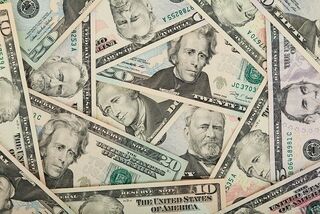Happiness
How to Make Yourself Miserable on 2 Million Dollars a Year
Is more money the key to happiness?
Posted September 28, 2022 Reviewed by Vanessa Lancaster
Key points
- Happiness is more about leading a full and meaningful life, not the size of your bank account.
- As we inch above an income level sufficient to meet our basic needs, further income boosts only contribute modestly to happiness.
- The Stoics advised that we should focus on what we can control, like what we do with our lives and how we think about our life experiences.

In my therapy practice, I once had a patient who felt depressed because he wasn’t doing as well as his neighbors and friends. He compared himself unfavorably with people from his community, decrying that his house was less impressive, his property smaller, and his car of lesser status than the ones he saw paraded around the neighborhood. In his mind’s eye, he was a failure, even though he had just cashed a $1 million bonus from his employer, a top Wall Street firm. This was on top of his nearly $1 million salary.
An investment banker in his late 40s, he based his self-esteem on how well he compared financially with others in his social milieu. In this high-end suburban community, his income put him squarely in the bottom half. A point underscored in his mind whenever he met up with friends or pulled his fancy–but not uber-fancy–car out of the driveway. He could readily recite the income levels of his golfing and squash partners–five million here, 10 million there, and so on.
How Envy Makes Us Miserable
Those of us trying to balance a checkbook, rein in household debt, or scrape by from paycheck to paycheck may find it difficult to empathize with this man’s predicament. We might imagine just how much happier we'd be if we earned but a quarter of his income, even a tenth. However, decades of psychological and social research show that wealth is not a recipe for personal happiness and well-being. Even a lottery jackpot notches only a temporary leap in happiness before returning to a baseline level.
Evidence does point to a clear relationship between income level and happiness at the lower strata of the income ladder. People making $30k tend to be less happy than those earning $50k, and those at $70k tend to be happier still. However, as we inch above a family income level sufficient to meet our basic needs, say from about $75k to $100k, any further boosts make only modest contributions to personal happiness, if any.
In other words, folks making $1 million a year tend to be only marginally happier than those earning $200k or $300k. There may be a genetic setpoint for happiness, a level around which well-being tends to settle regardless of circumstance or income level.
But another factor explaining why the happiness gradient tends to level off with increasing wealth is that we tend to rescale our expectations concerning our income level. When our income rises, we begin comparing ourselves to others who have more than we do, as my patient did. Or we hitch our happiness to obtaining the latest shiny thing–that high-end car or the elegant house surrounded by a huge plot of land.
We may think that happiness comes from stockpiling acquisitions, as though the person who dies with the most things wins. But whether we earn $30k or $300k, getting what we want does not yield lasting satisfaction but only a desire for more. Desire only begets more desire, and what we think will be enough to make us happy turns out to be never enough.
Social comparisons can bring us down, whether comparing bank accounts or profile pages on social media sites. We can always find people who have more than we do. It may be better not to make any comparisons at all, but if you must compare yourself to others, look down rather than up. We tend to compare ourselves to others we envy for having more of whatever we prize (looks, wealth, health, etc.). This puts a damper on our self-esteem. Rather than look upward, it may be better psychologically to look downward, taking account of the great mass of people who lack your good fortune and might gladly swap their lifestyle for yours.
If Not Wealth, Then What?
If not wealth, then what is the key to happiness? Although no one key fits all locks of happiness, research over the past several decades points to some consistent factors in the happiness equation, such as finding meaning and purpose in life, having a set of guiding beliefs, whether religious or otherwise, and maintaining strong social connections, including close intimate relationships, making each day count and investing in rewarding experiences rather than expensive purchases.
There is one source of ancient wisdom about attachment to desire for material things I’d like to share, something that rings as true today as it did when first espoused more than two thousand years ago.
Don’t Become a Slave to Desire
In the view of the Stoic philosophers of ancient Greece and Rome, craving wealth, status, or material possessions makes us a slave to desire. We may want things, but we shouldn’t want them so much that we become a slave to acquiring them and holding on to them. But you control whether you turn over your freedom to the cruel taskmaster called desire. You may prefer wealth over poverty and health over disease, but these are external events that we don’t directly control. The Stoics advised that we should focus on what we can control, like what we do with our lives and how we think about our life experiences.
We can also stop ourselves from falling into the trap of social comparison. Thousands of years before the emergence of social media, the Roman statesman and Stoic philosopher Seneca wrote, “No man when he views the lot of others is content with his own. This is why we grow angry even at the gods, because some person is ahead of us, forgetting how many men behind us, and how huge a mass of envy follows at the back of him who envies but a few.” Seneca added, “And how much do we acquire simply because our neighbors have acquired such things or because most men possess them!”
We can learn to be happy with what we’ve got and not spend our days yearning for things we cannot obtain. While it may be better to be rich than poor and healthy than infirmed, our happiness does not depend on it. The capacity for happiness resides within ourselves. As the Roman Emperor and Stoic philosopher Marcus Aurelius reminded us, “Very little is needed to make a happy life; it is all within yourself, in your way of thinking.”
Here are some additional thoughts on happiness from the ancient Stoics and a quip from a modern master of wit. From the Stoic sage Epictetus, “There is only one road to happiness— let this rule be at hand morning, noon, and night: stay detached from things that are not up to you.” And once more from Seneca, “No one can have whatever he wants. What he can do is not want what he doesn’t have and cheerfully enjoy what comes his way.” And more recently, from an early 20th-century popular philosopher and comic wit, Will Rogers, “Too many people spend money they earned to buy things they don’t want to impress people that they don’t like.”
General Disclaimer: The content here and in other blog posts on the Minute Therapist is intended for informational purposes only and not for diagnosis, evaluation, or treatment of mental health disorders. If you are concerned about your emotional well-being or experiencing any significant mental health problems, I encourage you to consult a licensed mental health professional in your area for a thorough evaluation.
© 2022 Jeffrey S. Nevid
References
Boyce, C. J., Daly, M., Hounkpatin, H. O., & Wood, A. M. (2017). Money may buy happiness, but often so little that it doesn’t matter. Psychological Science, 28, 544–546.
Corliss, R. (2003, January 20). Is there a formula for joy? Time Magazine, pp. 44–46.
Jebb, A. T., Tay, L., Diener, E., & Oishi, S. (2018). Happiness, income satiation and turning points around the world [Letter to the editor]. Nature Human Behavior, 2, 33–38
Kahneman, D., & Deaton, A. (2010). High income improves evaluation of life but not emotional well-being. Proceedings of the National Academy of Sciences, 107, 16489–16493. Genetics, 15, 25–30.
Kahneman, D., Krueger, A. B., Schkade, D., Schwarz, N., & Stone, A. A. (2006). Would you be happier if you were richer? A focusing illusion. Science, 312, 1908–1910.
Proto, E., & Rustichini. A. (2013). A reassessment of the relationship between GDP and life satisfaction. PLoS ONE, 8, e79358.
Sussman, A. B., & Shafir, E. (2012). On assets and debt in the psychology of perceived wealth. Psychological Science, 23, 101–108.




